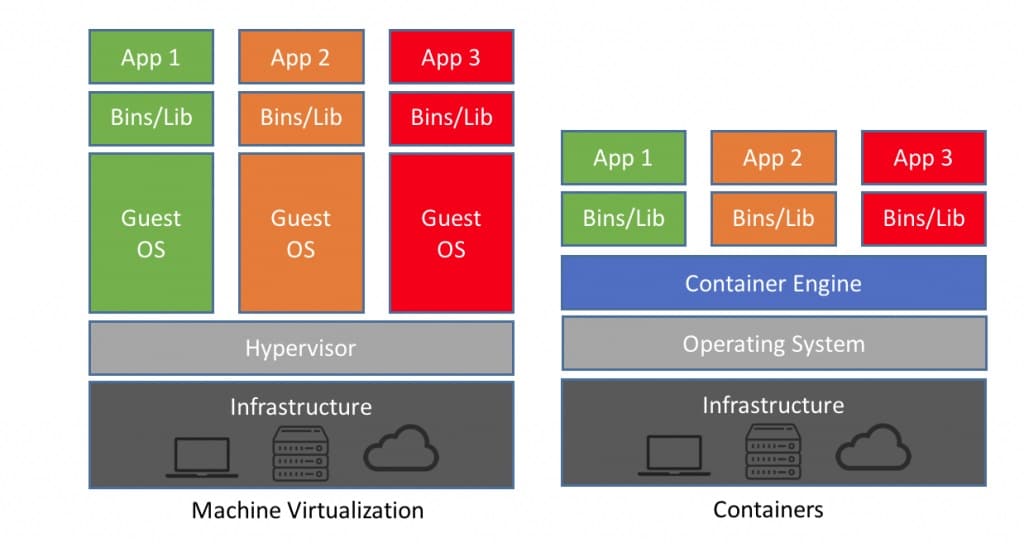Some Advantages of Containerized Application Development Are
- decreased use of physical resources. Some advantages of containerized application development are.

Https Thenewstack Io Kubernetes An Overview Distributed Computing Master Schedule Diagram Architecture
The app isolation helps the operating team to deploy.

. 5 Improve App Security Containerization helps businesses to run multiple applications and services efficiently on a single host. It does not require an operating system of its own. Application container technologyjust like any other form of innovation in todays IT landscapeis gaining momentum across organizations on a large scale.
But containerization still runs the apps independently and in isolation. Integration is perhaps the most significant advantage containerization offers. There are many good reasons to containerize apps.
For example containers are ideally suited to microservice-type application development -- an approach that allows more complex applications to be configured from basic building blocks where each building block is deployed in a container and the constituent containers are linked together to form the cohesive application. Containerization also provides developers with a new level of efficiency as it promotes a rapid development environment. The enterprises can even run test and deploy the same app on multiple operating systems simultaneously.
While this practice delivers some of the basic benefits of operating system virtualization it does not offer the full benefits of a modular. 4 Major Benefits of Using Kubernetes. Kubernetes is the principal resolution for container orchestration.
4 some advantages of containerized application development are. Provide enhanced distributed computing capabilities. Containers provide a lightweight fast and isolated infrastructure to run your applications.
These containers provide you with the flexibility to quickly create new containerized instances of applications to address growing traffic or rapidly destroy multiple containers to reduce cloud costs. Thus containers are inherently smaller in capacity than a VM and. Containers consume less system requirements than traditional hardware or a VM type of setup.
Since they are more lightweight they are more flexible and can be backed up and restored faster. Kubernetes an open-source method for deploying scaling and managing containerized applications manages container preparation work on a compute cluster and manages workloads to ensure they run as indicated by the user. The efficiency derived from containers is unmatched.
Containers enable rapid deployment patching and scaling of applications. Some organizations use containers to migrate existing applications into more modern environments. A properly containerized program will run smoothly and identically on any operating system.
Computing resources to be available on-demand by clients. How containerized applications benefit. No these arent shipping containers however most people working in a tech field have heard the term container come up in some technical design meeting or discussing the future of technology It has quickly become a buzzword and an important concept but what actually is a container.
- robust developer community creating tools for administration. Choose two - cannot interfere with each others operation. As each container has its own userspace multiple containers can run on a single host machine.
Companies wont get a ton of benefit from just wrapping a large existing application in a container and calling it good Benefits of Containerization. Containerised applications take advantage of the scalability of cloud infrastructure coping with peaks and troughs in demand. Provide better security and governance external to the containers.
Container technology in itself provides some immediate benefits to productivity notably in terms of the speed for provisioning new resources and deploying the code. For enterprises dealing with application development the technology renders a standardized packaging and run-time management of underlying application components. Software running in containerized environments shares the machines OS kernel and application layers within a container can be shared across containers.
This is what makes containers lightweight scalable and highly versatile. They also move quickly and reliably from one computing environment to another for example moving from a development environment to a full-scale production environment. Security and governance services are platform-specific not application-specific.
Also the container engine can leverage any OS security isolation techniquessuch as SELinux access controlto isolate faults within containers. In recent years application development has started to focus on a new concept. Pros of Containerization.
As you can see application containers have their advantages and disadvantages. Reduced cost of infrastructure operations There are usually many containers running on a single VM Solution scalability on the microservicefunction level No need to scale instancesVMs Better security. Choose two greater efficiency through shared computing resources.
- easy to control access to shared resources. Typically a matter of seconds. Over time containers will likely become more secure and easier to use just as server virtualization also improved as it matured.
Choose two robust developer community creating tools for administration. Some containerization products can handle such applications but others cannot without risking security. Here is the list of the top nine benefits that help in driving containerization adoption.
This container runs on top of the host operating system that of the server. Placing security and governance services outside of the container significantly reduces complexity. For example consider how much faster it is to provision start up and scale a new container image.

Containerization In 2022 Guide To Portable Modern Apps

The Benefits Of Containerization And What It Means For You Ibm

Top 5 Benefits Of Using Containers Benefit Nature Friendly Abc
Comments
Post a Comment